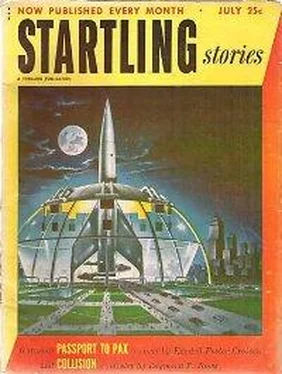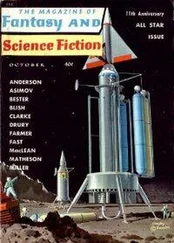Arthur Clarke - All the Time in the World
Здесь есть возможность читать онлайн «Arthur Clarke - All the Time in the World» весь текст электронной книги совершенно бесплатно (целиком полную версию без сокращений). В некоторых случаях можно слушать аудио, скачать через торрент в формате fb2 и присутствует краткое содержание. Город: Kokomo, IN, Год выпуска: 1952, Издательство: Better Publications, Inc., Жанр: Фантастика и фэнтези, на английском языке. Описание произведения, (предисловие) а так же отзывы посетителей доступны на портале библиотеки ЛибКат.
- Название:All the Time in the World
- Автор:
- Издательство:Better Publications, Inc.
- Жанр:
- Год:1952
- Город:Kokomo, IN
- ISBN:нет данных
- Рейтинг книги:5 / 5. Голосов: 1
-
Избранное:Добавить в избранное
- Отзывы:
-
Ваша оценка:
- 100
- 1
- 2
- 3
- 4
- 5
All the Time in the World: краткое содержание, описание и аннотация
Предлагаем к чтению аннотацию, описание, краткое содержание или предисловие (зависит от того, что написал сам автор книги «All the Time in the World»). Если вы не нашли необходимую информацию о книге — напишите в комментариях, мы постараемся отыскать её.
All the Time in the World — читать онлайн бесплатно полную книгу (весь текст) целиком
Ниже представлен текст книги, разбитый по страницам. Система сохранения места последней прочитанной страницы, позволяет с удобством читать онлайн бесплатно книгу «All the Time in the World», без необходимости каждый раз заново искать на чём Вы остановились. Поставьте закладку, и сможете в любой момент перейти на страницу, на которой закончили чтение.
Интервал:
Закладка:
The Nine Billion Names of God
by Arthur C. Clarke
“This is a slightly unusual request,” said Dr Wagner, with what he hoped was commendable restraint. “As far as I know, it’s the first time anyone’s been asked to supply a Tibetan monastery with an Automatic Sequence Computer. I don’t wish to be inquisitive, but I should hardly have thought that your—ah—establishment had much use for such a machine. Could you explain just what you intend to do with it?”
“Gladly,” replied the lama, readjusting his silk robes and carefully putting away the slide rule he had been using for currency conversions. “Your Mark V Computer can carry out any routine mathematical operation involving up to ten digits. However, for our work we are interested in letters, not numbers. As we wish you to modify the output circuits, the machine will be printing words, not columns of figures.”
“I don’t quite understand…”
“This is a project on which we have been working for the last three centuries—since the lamasery was founded, in fact. It is somewhat alien to your way of thought, so I hope you will listen with an open mind while I explain it.”
“Naturally.”
“It is really quite simple. We have been compiling a list which shall contain all the possible names of God.”
“I beg your pardon?”
“We have reason to believe,” continued the lama imperturbably,” that all such names can be written with not more than nine letters in an alphabet we have devised.”
“And you have been doing this for three centuries?”
“Yes: we expected it would take us about fifteen thousand years to complete the task.”
“Oh,” Dr Wagner looked a little dazed. “Now I see why you wanted to hire one of our machines. But what exactly is the purpose of this project?”
The lama hesitated for a fraction of a second, and Wagner wondered if he had offended him. If so, there was no trace of annoyance in the reply.
“Call it ritual, if you like, but it’s a fundamental part of our belief. All the many names of the Supreme Being—God, Jehova, Allah, and so on—they are only man-made labels. There is a philosophical problem of some difficulty here, which I do not propose to discuss, but somewhere among all the possible combinations of letters that can occur are what one may call the real names of God. By systematic permutation of letters, we have been trying to list them all.”
“I see. You’ve been starting at AAAAAAA… and working up to ZZZZZZZZ…”
“Exactly—though we use a special alphabet of our own. Modifying the electromatic typewriters to deal with this is, of course, trivial. A rather more interesting problem is that of devising suitable circuits to eliminate ridiculous combinations. For example, no letter must occur more than three times in succession.”
“Three? Surely you mean two.”
“Three is correct: I am afraid it would take too long to explain why, even if you understood our language.”
“I’m sure it would,” said Wagner hastily. “Go on.”
“Luckily, it will be a simple matter to adapt your Automatic Sequence Computer for this work, since once it has been programmed properly it will permute each letter in turn and print the result. What would have taken us fifteen thousand years it will be able to do in a hundred days.”
Dr Wagner was scarcely conscious of the faint sounds from the Manhattan streets far below. He was in a different world, a world of natural, not man-made, mountains. High up in their remote aeries these monks had been patiently at work, generation after generation, compiling their lists of meaningless words. Was there any limit to the follies of mankind? Still, he must give no hint of his inner thoughts. The customer was always right…
“There’s no doubt,” replied the doctor, “that we can modify the Mark V to print lists of this nature. I’m much more worried about the problem of installation and maintenance. Getting out to Tibet, in these days, is not going to be easy.”
“We can arrange that. The components are small enough to travel by air—that is one reason why we chose your machine. If you can get them to India, we will provide transport from there.”
“And you want to hire two of our engineers?”
“Yes, for the three months that the project should occupy.”
“I’ve no doubt that Personnel can manage that.” Dr Wagner scribbled a note on his desk pad. “There are just two other points—”
Before he could finish the sentence the lama had produced a small slip of paper.
“This is my certified credit balance at the Asiatic Bank.”
“Thank you. It appears to be—ah—adequate. The second matter is so trivial that I hesitate to mention it—but it’s surprising how often the obvious gets overlooked. What source of electrical energy have you?”
“A diesel generator providing fifty kilowatts at a hundred and ten volts. It was installed about five years ago and is quite reliable. It’s made life at the lamasery much more comfortable, but of course it was really installed to provide power for the motors driving the prayer wheels.”
“Of course,” echoed Dr Wagner. “I should have thought of that.”
The view from the parapet was vertiginous, but in time one gets used to anything. After three months, George Hanley was not impressed by the two-thousand-foot swoop into the abyss or the remote checkerboard of fields in the valley below. He was leaning against the wind-smoothed stones and staring morosely at the distant mountains whose names he had never bothered to discover.
This, thought George, was the craziest thing that had ever happened to him. “Project Shangri-La’, some wit back at the labs had christened it. For weeks now the Mark V had been churning out acres of sheets covered with gibberish. Patiently, inexorably, the computer had been rearranging letters in all their possible combinations, exhausting each class before going on to the next. As the sheets had emerged from the electromatic typewriters, the monks had carefully cut them up and pasted them into enormous books. In another week, heaven be praised, they would have finished. Just what obscure calculations had convinced the monks that they needn’t bother to go on to words of ten, twenty, or a hundred letters.
George didn’t know. One of his recurring nightmares was that there would be some change of plan, and that the high lama (whom they’d naturally called Sam Jaffe, though he didn’t look a bit like him) would suddenly announce that the project would be extended to approximately A.D. 2060. They were quite capable of it.
George heard the heavy wooden door slam in the wind as Chuck came out on to the parapet beside him. As usual, Chuck was smoking one of the cigars that made him so popular with the monks—who, it seemed, were quite willing to embrace all the minor and most of the major pleasures of life. That was one thing hi then: favour: they might be crazy, but they weren’t bluenoses. Those frequent trips they took down to the village, for instance…
“Listen, George,” said Chuck urgently. I’ve learned something that means trouble.”
“What’s wrong? Isn’t the machine behaving?” That was the worst contingency George could imagine. It might delay his return, and nothing could be more horrible. The way he felt now, even the sight of a TV commercial would seem like manna from heaven. At least it would be some link with home.
“No—it’s nothing like that.” Chuck settled himself on the parapet, which was unusual because normally he was scared of the drop. “I’ve just found what all this is about.”
“What d’ya mean? I thought we knew.”
“Sure—we know what the monks are trying to do. But we didn’t know why. It’s the craziest thing—”
Читать дальшеИнтервал:
Закладка:
Похожие книги на «All the Time in the World»
Представляем Вашему вниманию похожие книги на «All the Time in the World» списком для выбора. Мы отобрали схожую по названию и смыслу литературу в надежде предоставить читателям больше вариантов отыскать новые, интересные, ещё непрочитанные произведения.
Обсуждение, отзывы о книге «All the Time in the World» и просто собственные мнения читателей. Оставьте ваши комментарии, напишите, что Вы думаете о произведении, его смысле или главных героях. Укажите что конкретно понравилось, а что нет, и почему Вы так считаете.












